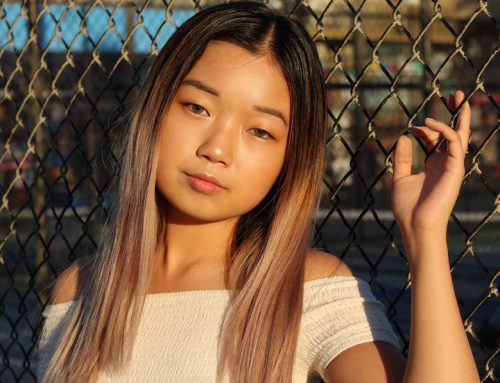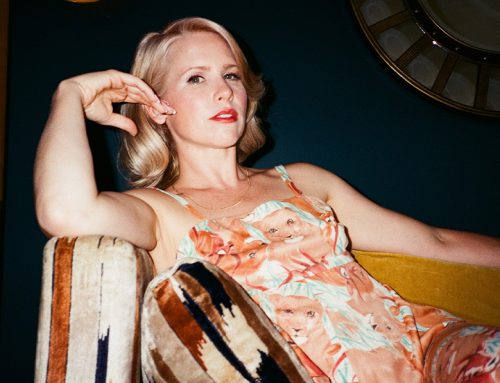The interpretative nature of music is a vital part of the relationship between the artist and the audience, which is something that Canadian indie pop singer-songwriter Lou Canon does not take lightly. With a desire to create her own rules and sound, she refuses to let herself be confined to one genre, and the ethereal atmosphere she creates encourages her audience to open themselves to an experience of emotional enlightenment.
Transitioning from her job as an elementary school teacher, Canon began learning music on the side, but more so, she found a platform to share her stories and feelings. Through introspective quests, Canon delivers us a liberated third studio album, “Audomatic Body,” bringing heavy emotional insight through lyrics and a spot-on sonic atmosphere. With waves of futuristic experimentalism, Lou has us sitting on the edge of our seats excited for every subsequent track.
We wanted to learn more about Lou Canon and her creative visions. We let her fill in the blanks:
Congratulations on putting out your new single “M.O.T.R,” it’s truly such a creative and emotional piece. Could you tell us the story behind it? (*Just for your consideration* How it was recorded and written if you’re comfortable telling)
I wrote this song in California. I was alone, tucked away next to the Pacific Ocean, at the mouth of the Russian River. I spent long days and long nights working manically. I felt alive, electric, honest. As though my body was learning to breathe again. This song speaks to a time when we feel flat. When as lovers we have lost touch with one another. When we need separateness to understand the ways in which we can still be together, stay together.
“M.O.T.R” is the first single off of your third studio album, Audomatic Body, which came out on July 10th – Can you tell us a little more about the album?
M.O.T.R. is a significant song on this record. There is a spoken word poem tucked away in the middle, delivered in French. It really is the belly of this record. It is the beating pulse. And it’s open for your interpretation.
Has your musical vision shifted for this project?
I sing the lead on this record, but there are ten other voices that join me throughout. This is new for me. The first song on the record (called The Chorus) introduces these voices collectively. And pays homage to our collaborative efforts. Together, we set the flavour. We temper the mood. We provoke contemplation. We ask you to soften, to be sensuous, to turn inward to the body. Mostly, it is asking for presence — a shift from the automatic to the intentional.
When unexpectedly pivoting from a very free and open life to a quarantined and cautious lifestyle, did you notice any difference in your creative process?
Yes, I did. I correlate new spaces with new works. The peaks of my creativity are often paired with a break in routine. I have become an expert at packing an entire studio into a small bag. I can set up in quiet corners — on a stranger’s dining room table, at the foot of a motel bed. But now I spend all my time at home. I find myself arranging and rearranging, pulling things apart and piecing them back together. I’m learning to look at an old space with new eyes. And to be frank, I think it’s a healthier, far more effective way of operating.
In just a few words, how would you describe your sound?
Swampy waters filled with electric eels. I don’t fit into any one genre. Maybe you could say sensual-noir-pop?
Who or what influenced you to make music?
My brother-in-law, Hayden. He was, and continues to be, a very big influence. He revealed a path that I hadn’t seen before. He encouraged me to write my own songs. I made my first record with him. He lent me a vintage drum machine that shaped the sound of my second record. He’s around anytime I need him — tech support, complaints department, human soundboard, you name it. Lucky me!
Do you have any advice for artists who want to learn the versatility of songwriting, singing, and producing such as yourself?
Figure out how to operate independently or within your collective. Learning to record on my own afforded me much needed freedom.
What’s the most rewarding part of being a musician for you?
Using my voice. In a lot of respects, I get to make my own rules.
What’s something people don’t know about you?
I am inherently shy. I find it difficult to talk about myself at length.
What are you listening to right now?
I just finished listening to a beautiful book on tape by Zora Neale Hurston called Their Eyes Were Watching God. I’ve been digging through my vinyl collection, returning with comfort to some of my favourite Black artists — Nina Simone, Marvin Gaye, Abner Jay, Otis Redding, John Coltrane, Erykah Badu, A Tribe Called Quest, Bill Withers, King Tubby, Beverly Glenn-Copeland… And on the new side, I’ve been enjoying Bleached Wavves, an album by an Indigenous artist (and fellow label-mate) by the name of Zoon.
Make sure to keep up to date with everything Lou Canon through her Instagram and listen to her addicting new LP below!










priligy results Previous clinical studies implicated genetic germline polymorphisms in at least 12 ABC genes with risk of adverse drug reactions or altered chemotherapy efficacy Tables 1, 2, 3 and Supplementary Table 2